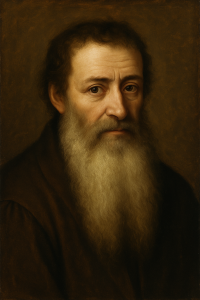
Johannes Oecolampadius was a German-Swiss reformer who led the Protestant movement in Basel and became a major figure in the early Reformed tradition. A humanist scholar and gifted preacher, he was closely allied with Ulrich Zwingli and shared his symbolic understanding of the Lord’s Supper. Though quieter and less combative than many of his contemporaries, Oecolampadius shaped the Reformation in Switzerland through his biblical exegesis, pastoral reforms, and steady leadership. He played a decisive role in bringing Basel into the Protestant fold and left a theological legacy that influenced later Reformed thought.
Early Life and Education
Oecolampadius was born Johannes Heussgen (or Hausschein) in 1482 in Weinsberg, Germany. Following the humanist fashion, he adopted the Greek form of his surname, “Oecolampadius,” meaning “house lamp.”
He studied at Heidelberg, Bologna, and Tübingen, excelling in classical languages and theology. Ordained as a priest in 1510, he became known for his scholarship and preaching. By the 1510s, he was deeply influenced by Erasmus and humanist biblical studies, which fueled his desire for reform.
Career and Move Toward Reform
In 1515, Oecolampadius assisted Erasmus in preparing the first printed edition of the Greek New Testament. This experience deepened his conviction that reform must be rooted in Scripture. He served briefly as a preacher in Augsburg but increasingly distanced himself from traditional Catholic practices.
By 1522, Oecolampadius had embraced evangelical teaching. His preaching in Basel began to call for a return to biblical simplicity in worship, the rejection of abuses like indulgences, and the primacy of the gospel. His reputation grew as a thoughtful but firm reformer.
Reformation in Basel
In 1525, Oecolampadius became preacher at Basel’s Cathedral (Münster), giving him a prominent pulpit. He introduced systematic preaching through books of the Bible, emphasized congregational psalm singing, and called for moral and doctrinal reform.
Basel, a city of printers and scholars, proved fertile ground for reform. After years of debate and public disputations, the city officially embraced the Reformation in 1529. Oecolampadius’s steady leadership was crucial in guiding the transition peacefully, with relatively little bloodshed compared to other centers of reform.
Theology and Worship
Like Zwingli, Oecolampadius taught that the Lord’s Supper was symbolic: a commemoration in which believers receive Christ spiritually by faith, rather than physically. This view set him at odds with Luther but placed him firmly within the Reformed tradition.
He emphasized the sovereignty of God, the centrality of Scripture, and the necessity of personal faith. His liturgical reforms simplified worship: Scripture reading, preaching, prayer, and psalm singing replaced elaborate Catholic rituals.
Oecolampadius also contributed commentaries on Isaiah, Ezekiel, and other biblical books, demonstrating his skill as an exegete.
Relationship with Other Reformers
Oecolampadius was a close ally of Zwingli and worked with him at the Marburg Colloquy in 1529, attempting (unsuccessfully) to reach agreement with Luther on the Eucharist. Though overshadowed by more forceful personalities, Oecolampadius was respected for his learning, humility, and moderation.
His connections extended widely: he corresponded with Erasmus, debated Anabaptists, and influenced younger reformers like Martin Bucer and John Calvin.
Death and Legacy
Oecolampadius died in 1531, only a few weeks after Zwingli’s death at the Battle of Kappel. His passing deprived the Swiss Reformation of one of its most stabilizing figures.
Though not as well remembered as Luther, Calvin, or Zwingli, Oecolampadius was instrumental in consolidating the Reformation in Basel and beyond. His biblical scholarship, pastoral reforms, and theological clarity shaped the emerging Reformed tradition.
Books on Johannes Oecolampadius
Johannes Oecolampadius: Prophet of Basel
By Amy Nelson Burnett (1994)
A comprehensive biography of Oecolampadius’s life, theology, and role in the Swiss Reformation.The Reformation: A History
By Diarmaid MacCulloch (2003)
Includes a reliable overview of Oecolampadius and his relationship with other reformers.Oecolampadius and the Basel Reformation
By Hughes Oliphant Old (1985)
Examines Oecolampadius’s preaching, worship reforms, and contribution to the Reformed liturgical tradition.The European Reformations
By Carter Lindberg (2010)
Provides context for Oecolampadius’s role within the broader Reformation movement.Reformed Confessions of the 16th Century
Edited by Arthur C. Cochrane (1966)
Contains confessional documents shaped by the theology of Zwingli, Oecolampadius, and early Swiss Reformed leaders.

